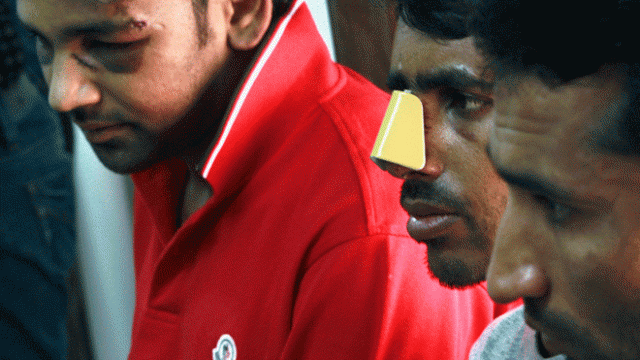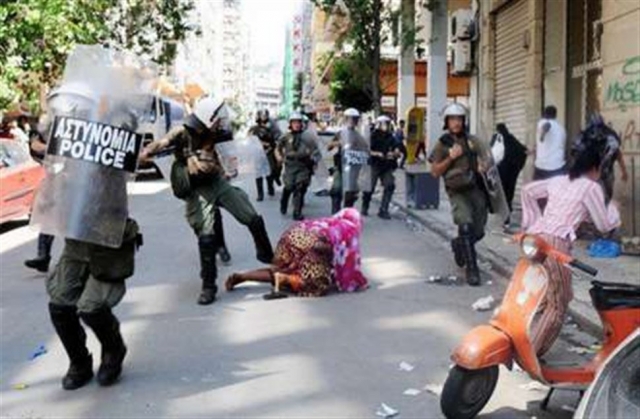Anastasia Balezdrova
The shooting against the immigrant workers in the strawberry plantations in the Peloponnese last week was the most recent evidence of the increasing racist violence in Greece over the past year.
However, if this case attracted the attention of Greek and international media for days, there are hundreds of others that remain hidden from the public. Meanwhile, from January to December 2012, the non-governmental Recording Network of Incidents of Racist Violence collected data on 154 attacks with racist motives. In 151 of the cases, the victims were immigrants or refugees and in 3 cases the attacked citizens were from European countries - Romania, Bulgaria and Greece.
The representatives of the 30 NGOs involved in the Network state that the attacks have increased three- or four-fold but the victims have been afraid to complain.
"What stops them is the lack of documents for their legal stay in Greece. In the majority of cases, the police authorities focus their questions on the fact that the immigrant is not legally residing in the country and they do not pay attention to his or her complaint," says lawyer Vassilis Papastergiou, who is an associate of the organization.
Although the majority of the attacks had been carried out in the "hot zone" in the centre of Athens, such cases were registered in different parts of Greece too. In 66 cases, the victims of the attacks were heavily injured and slightly in 76 cases. All attacks were carried out along with threats, curses and damage to their property.

According to statistics, the attacks take place during the evening and in the early morning hours. The victims are mostly men from South Asia, Middle East and Africa. They indicate as a reason for the attack the fact that they are foreigners or a detail associated with their identity: colour of skin, their origin or religion. In the case of women, two out of five attacks are linked to the fact that their faces are wrapped with a cloth.
The attackers are always men except for eight cases in which there were women among them. According to the victims, the average age of the attackers is 27 years and the vast majority of them are Greeks. Attacks by groups that include persons of Albanian origin were also registered in the centre of Athens. Sometimes some of the attacks involve young people and a large number of them take place in the streets, in parks or at bus stops.
The stories of the victims have revealed the existence of regions, especially in the centre of Athens, where immigrants do not dare to go for fear of attacks. In eight of the cases registered, the victims have indicated the involvement of members of Golden Dawn, whom they had recognized by their clothing, the signs of the organization, their participation in party meetings or in local party structures in the neighbourhoods.
The results were presented by the head of the Greek representation of the United Nations Supreme Secretariat for Refugees George Tsarbopoulos. He stressed that the data had been obtained directly from the victims of the attacks and that they were especially valuable, bearing in mind the lack of a formal and effective mechanism to record the attacks and eliminate the phenomenon.

However, the fact that the attacks in recent months involved representatives of institutions is particularly disturbing.
The head of the Hellenic Committee for Human Rights Kostis Papaioannou paid particular attention to the fact that the majority of these attacks involved policemen. According to statistics, they are 25 in number, 7 of which took place in the lock-ups of different police stations.
In 6 cases, the attacker was a public transport driver and in two others – ticket-collectors, who beat an Afghan citizen, because he was travelling without a ticket.
"Racist violence is steadily growing and its goal is no longer threat. The attackers want victims," he said, and their arsenal proves this: bats, iron rods, sticks, sprays, chains, knuckle dusters, knives and broken bottles. Some of the groups set up in the area of Agios Panteleimonas and Attikis square even "patrolled" with large dogs.
"Although there have been some signs of a positive response from the authorities, they are still insufficient," said the representative of the legal affairs committee of the Network Vassilis Papastergiou. He welcomed the establishment of special police units to combat racist violence, but added that in order for them to be effective, their members should be properly trained. The main proposals of the organization are cancellation of the extradition measure when the immigrant is a victim of racist violence at least during the course of the investigation of the case and changing the penal code by introducing the attack with racist motives as a separate offence. "The racist motive must be taken into account during the full investigation of the case, not just at the final determination of the sentence as is the case at present," he added.
It is worth noting that the Greek citizen was attacked because of his sexual orientation, and attacks against Roma, members of the Muslim minority in northern Greece and other minority groups, have become increasingly frequent.
"The Greek state is obliged to change its position and to confront those who hide behind the strategy of tension. It starts with immigrants, but does not stop there. All traditional targets of neo-Nazis have become their target too." According to Kostis Papaioannou, the political system is wrong if it thinks that it can stop the phenomenon at any time. "All parties, whether they are in parliament or not, must unite and act together, despite all the differences between them," he said, adding that the activities at schools should be particularly enhanced because of the increased racist violence among pupils.
Finally, Reza Gholami, president of the Association of United Afghan Political Refugees in Greece, summarized by saying, "The figures we have presented have little to do with reality. We are unable to register all attacks. A large number of undocumented immigrants are afraid to go out in the street. They are afraid of both the police and gangs. When we tell them to file a complaint, they smile because they had been to the police in the past where the officers there attacked them too. Their voices do not go farther than a few hundred metres from their homes. Imagine a democratic country in which one is afraid to leave his or her house. Today, it is the immigrants’ turn and tomorrow it will be other people’s turn."